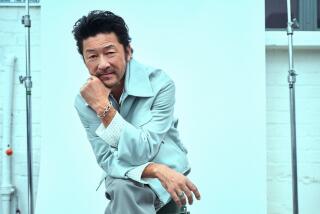Senjaku Nakamura Puts a Human Face on Kabuki
- Share via
TOKYO — Deep within the maze of souvenir shops, restaurants and offices that honeycomb the public spaces of the Kabukiza Theater, veteran actor Senjaku Nakamura II sits sipping tea and quietly discussing plans for a Grand Kabuki tour of North America that he insists will be unlike any other.
In the past, he points out, Kabuki-for-export has concentrated on one-act plays and excerpts. Now, however, a full-evening masterwork will be seen for the first time in 12 Canadian, Mexican and U.S. cities--including a five-day engagement at the Japan America Theatre in Los Angeles beginning Wednesday.
Even the style of performance will be different. “Most Kabuki seen outside of Japan has emphasized rough-and-tumble action or dancing,” Senjaku says. “But we wanted to bring a play that shows the heart of humanity, quiet and serious: Kabuki with a human face.” (Note: Kabuki stars are referred to by their illustrious given names rather than their family names.)
He hopes that the 18th-Century classic “A Messenger of Love in Yamato” (“Koi Bikyakyu Yamato Orai”) will interest foreign audiences in a comparatively restrained form of Kabuki associated with the refined theatrical tastes of Kyoto and Osaka: Kamigata Kabuki, long Senjaku’s speciality.
Based on a scandal of the time and adapted from a puppet drama by the Shakespeare of Japan, Chikamatsu Monzaemon, “A Messenger of Love in Yamato” traces the downfall of a young money courier (played by Senjaku) who falls in love with a courtesan, tries to buy her freedom with his client’s money and eventually is hunted down by the authorities and executed.
(Under the title “The Courier for Hell,” the original play is translated in Donald Keene’s “Major Plays of Chikamatsu,” published by Columbia University Press.)
The two acts of the work, “Fuingiri” and “Ninokuchimura,” are not often presented together in Japan these days, Senjaku says. “We are editing the play for the tour,” he explains, “(making) judicious cuts so that it can be more easily understood. The tempo will be high. We are cutting about a hour, leaving out the parts that aren’t directly connected to the story--we do that in Japan nowadays, too.”
Senjaku speaks of these cuts as “taking a traditional art and making it understandable to a modern audience,” an opinion seconded by Chikashi Mogi, general manager of the Kabukiza and executive director of Shochiku, the company that owns and runs the Grand Kabuki.
“There are so many plays in the repertory,” Mogi says, “1,000 dramas and hundreds of dance-plays as well. The popular plays are done over and over. There’s a tradition of redesigning and rewriting them from time to time. It’s necessary: As the times change you have to change your production to fit in with them.”
He agrees that the current tour (which coincides with the 100th anniversary season at the Kabukiza) represents a new phase in the company’s foreign relations.
“In the past, Kabuki was viewed (outside Japan) as an exotic thing,” he says, “whereas people are now looking on it as theater. The actors feel their performances are now being properly appreciated and that’s why they want to go overseas: They feel Kabuki can now be understood by foreign audiences.”
“Kabuki is very beautiful on a physical level and in the past plays were often chosen (for tours) that could be easily understood. Now, however, we feel we can take more complicated things.”
At 56, Senjaku says he considers himself “one of the fathers of Kabuki--the actors that are the teachers.” His eldest son, Tomotaro, 29, will play the courtesan Umegawa on the tour, the same role that Senjaku used to act opposite his own father, the late Ganjiro Nakamura II. The powerful Gato Kataoka V is also featured, cast as Senjaku’s rival in the first act and his father in the second.
Senjaku has been long devoted to Chikamatsu--a playwright more revered than performed in contemporary Japan--and he even named his touring company the Chikamatsu Troupe. However his emphasis on literary distinction and histrionic finesse should not imply any diminishing of Kabuki’s celebrated vigor, color or mix of disciplines. Indeed, Senjaku is quick to confirm the emphasis on sharply honed movement that sustains Kabuki performance.
“Dance training influences everything we do all the time,” he says. “Dance is the basis of Kabuki.”
Thus the crucial event of “A Messenger of Love in Yamato” is physical: the moment when young Chubei, goaded by the insults of a wealthy rival, breaks the seal on packets of money entrusted to his care and scatters gold coins, claiming they belong to him. (The title of Act I, “Fuingiri,” means “Breaking the Seal.”)
As Chubei understands, this deed immediately transforms him into a criminal: Breaking the seal has sealed his own fate. Moreover, the scattering of coins not only represents the climax of the drama but its central symbol.
Although the play as a whole is usually classified in the genre of love-suicide tragedies, “Fuingiri” is really about money. Chubei handles it in his work but doesn’t own enough of it to ransom Umegawa from her own financial servitude. Money loaned and owed obsesses the subsidiary characters as well.
Thus the passage when Chubei flaunts the packets--beating them on the floor and at last recklessly spilling their contents--involves more than just his desperate bravado. It is an action painting of an entire cash-and-carry society.
Like a key passage in a ballet classic, the seal-breaking can be executed in many ways that will shape the work’s meaning and effect differently.
“In the original version Chubei deliberately breaks the seal and is an active agent in his own downfall,” Senjaku says. “But next time (on the tour) it will be sort of accidental--I think that’s more dramatic. He will become a victim of circumstances, of fate.”
“It will seem more tragic that way, there will be more pathos at the moment when he realizes what’s he done and what’s going to happen.”
Senjaku smiles at the prospect. “Chubei knows it’s a death sentence,” he says. “The choice has been made and he has to continue on that path. There’s absolutely nothing he can do.”
More to Read
The biggest entertainment stories
Get our big stories about Hollywood, film, television, music, arts, culture and more right in your inbox as soon as they publish.
You may occasionally receive promotional content from the Los Angeles Times.










